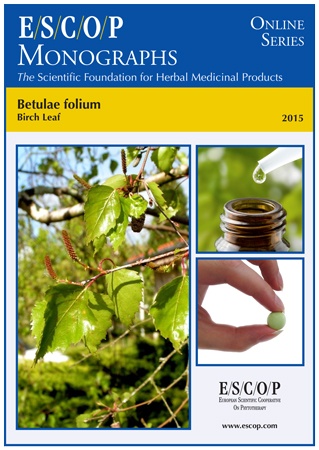 Betulae folium
Betulae folium
Betula pendula Roth.; Betula pubescens Ehrh.
Published 2015
Format: PDF
 Online viewing (for only €30 per year, you can view online all the monographs)
Online viewing (for only €30 per year, you can view online all the monographs)
SUMMARY:
The herbal monograph selects and summarises scientific studies and textbooks regarding efficacy, dosage and safety supporting the therapeutic uses of birch leaf.
This herbal drug by definition consists of the whole or fragmented dried leaves of Betula pendula Roth and/or Betula pubescens Ehrh. as well as hybrids of both species.
Studies with its main characteristic constituents flavonol glycosides, principally hyperoside and other quercetin glycosides together with glycosides of myricetin and kaempferol, are included.
The therapeutic indications are irrigation of the urinary tract, especially in cases of inflammation and renal gravel and as an adjuvant in the treatment of bacterial infections of the urinary tract.
Administration of birch leaf addresses: posology; its duration of use; contra-indications; special warnings; special precautions for use; interactions with other medicinal products; other forms of interaction; in pregnancy and lactation; its effects on ability to drive; undesirable effects; overdose.
In vitro experiments with birch leaf demonstrate diuretic, ant-inflammatory and antioxidant properties.
In vivo experiments with animals demonstrate diuretic and gastroprotective effects.
Controlled and open clinical studies with birch leaf demonstrated its use as an anti-inflammatory and an antimicrobial agent in patients suffering from urinary tract infections, cystitis and other inflammatory complaints.
Preclinical safety for birch leaf was assessed in the Ames test.
Safety data assessed in a human study indicated, that rare mild adverse effects occurred.
The selection of literature cited in the monograph is aimed at bringing together relevant information about the possible physiological roles of birch leaf and its major constituents.
KEYWORDS:
- Betula pendula Roth.; Betula pubescens Ehrh.
- Betulae folium
- Birch Leaf
- Urinary tract irrigation for inflammation and renal gravel; Urinary tract bacterial infections